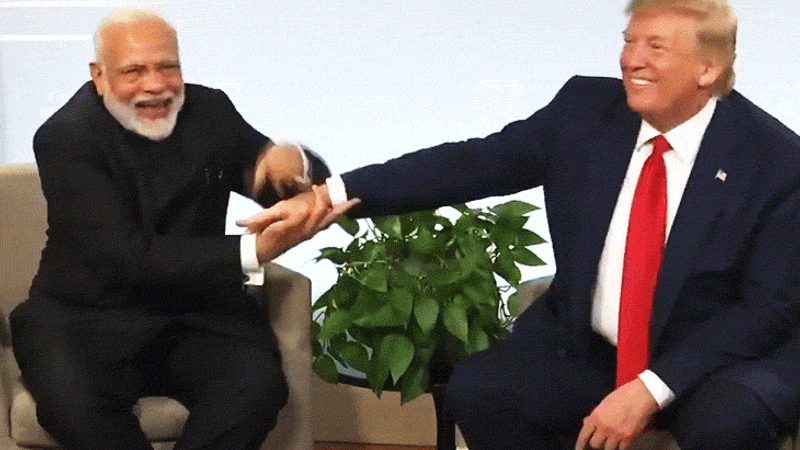Published 13:34 IST, November 6th 2024
Trump 2.0: What a Second Term Could Mean for India-US Relations
GOP leader has stated that both PM Modi and Trump have the potential to grow the global economy together, with both New Delhi and Washington needing each other.

US Elections 2024 : As former President Donald Trump emerges as a strong contender for a second term in the White House, the future of India-US relations is once again under the microscope. Prime Minister Narendra Modi and Trump enjoyed a robust personal rapport during Trump's first presidency, with high-profile events such as "Howdy, Modi!" and "Namaste Trump" showcasing their camaraderie.
Richard McCormick, US lawmaker and GOP leader has stated that both leaders have the potential to grow the global economy together, with both New Delhi and Washington needing each other more than ever.
But with Trump's potential return, questions arise about the direction his foreign policy will take, particularly in its impact on India.
During his first term, Trump’s foreign policy was defined by an "America First" approach, prioritizing US interests and frequently challenging multilateral agreements. A second Trump administration is likely to continue in this vein, with significant implications for India across key areas such as trade, immigration, military cooperation, and diplomacy.
Focus on India-US trade ties
One of the most significant areas where Trump’s second term could affect India is trade. Trump's protectionist stance, particularly on tariffs, was a hallmark of his first presidency. In recent months, he has reiterated his commitment to imposing tariffs on countries like China and India, calling out India's high tariff rates on US products. During a rally, Trump claimed, “India is a very big charger” when it comes to tariffs, signaling that reciprocal trade policies might be on the horizon.
For India, which relies heavily on exports to the US, such policies could have a significant impact on key sectors like IT, pharmaceuticals, and textiles. The possibility of higher tariffs could strain India’s trade relationship with the US. However, there could be an upside for India as Trump continues to push for supply chain decoupling from China. This could create opportunities for India to position itself as a global manufacturing hub, attracting US businesses seeking alternatives to Chinese production.
Immigration: What’s the impact on the Indian workforce?
Trump’s tough stance on immigration, particularly his targeting of the H-1B visa program, poses another challenge for India. In his first term, Trump introduced stricter measures to curb immigration, including increased wage requirements for foreign workers. This policy disproportionately affected Indian professionals, especially in the IT sector. If reintroduced, such measures could impact Indian tech workers' ability to work in the US, creating friction for Indian technology firms that rely on skilled Indian talent.
India’s External Affairs Minister S. Jaishankar recently suggested that under a second Trump administration, there would likely be “difficult negotiations over trade and immigration,” but he also noted Trump’s generally positive relationship with India and Modi. The outcome of these negotiations could shape the flow of talent and businesses between the two countries.
Everything to know about military ties and defense cooperation
One of the cornerstones of India-US relations in recent years has been defense cooperation. Trump’s first term saw significant strides in this area, with landmark agreements like the General Electric-Hindustan Aeronautics Limited (GE-HAL) deal to manufacture jet engines and joint military exercises aimed at countering China’s growing influence in the Indo-Pacific region.
In a second term, Trump is likely to maintain a strong military partnership with India, particularly given the shared interests in countering China’s geopolitical ambitions.
The Quad alliance, which includes the US, India, Japan, and Australia, was also strengthened during Trump’s presidency, and a renewed Trump administration could see further military cooperation, arms sales, and technology transfers. Trump's "Peace through Strength" doctrine could align with India’s security goals, especially in its efforts to counter terrorism from Pakistan .
Knowing the diplomatic landscape: Challenges & opportunities
While Trump's “America First” foreign policy approach may lead to a more isolationist US, it also presents an opportunity for India to assert itself on the global stage. Trump’s skepticism of multilateralism could see him continue to pivot away from international agreements, creating room for India to fill the gap in areas such as climate change and regional security.
India, as a major strategic partner of the US, could benefit from this shifting dynamic. However, it will need to navigate the complexities of a US foreign policy that prioritizes national interest and economic self-sufficiency.
Updated 14:13 IST, November 6th 2024




